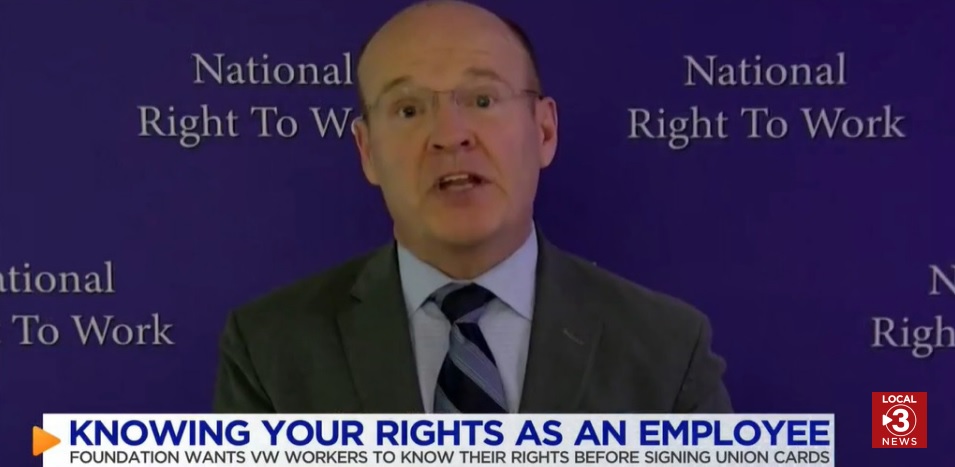The following article is from the National Right to Work Legal Defense Foundation’s bi-monthly Foundation Action Newsletter, May/June 2024 edition. To view other editions of Foundation Action or to sign up for a free subscription, click here.
Brief challenges Labor Board’s attempt to expand coercive, anti-employee organizing scheme
New ‘card check’-friendly Biden NLRB rules could lock workers at Volkswagen’s Chattanooga, TN, production plant under union power without even a secret ballot vote, Mark Mix warned on Chattanooga’s local NBC station in February.
SAN FRANCISCO, CA – Union-label bureaucrats at the Biden National Labor Relations Board (NLRB) have pulled out all the stops in their attempt to foist union monopoly control on more workers. But perhaps no move from the Biden Labor Board has been as radical as its October 2023 ruling in Cemex Construction Materials Pacific.
In response, Foundation staff attorneys recently filed a brief at the Ninth Circuit Court of Appeals, exposing the NLRB’s sweeping power grab as a ploy to erode workers’ right to vote in secret on union representation. The Foundation is urging the Court of Appeals to overturn the NLRB’s controversial Cemex ruling.
In the August 2023 Cemex decision, the Biden-appointed NLRB majority gave union officials massive new powers to bypass a secret ballot vote among workers when trying to install union control at a workplace. The new standard effectively requires employers to accept a union’s claim to represent workers based on the coercive “card check” process.
Seattle Mariners Employee’s Case Reveals Unreliability of Card Check
Card check is a process that uses “authorization cards” solicited and collected by union organizers as a substitute for workers’ votes in a secret ballot election. The card check process lacks the security of a secret ballot vote and exposes workers to pressure tactics and intimidation from union officials who seek to secure enough authorization cards. Under the Biden Board’s new policy, employers’ options to insist on a secret ballot vote are limited and can be blocked by a union-requested ruling against the employer.
The Foundation’s brief discusses the struggle of Tami Kecherson, a Seattle Mariners retail employee who received free Foundation legal aid during her fight to remove a union in 2023, as a glaring example of card check’s unreliability in gauging workers’ true desires. Kecherson works in one of two retail shops that were under the control of the United Food and Commercial Workers (UFCW) union up until last year. UFCW union officials gained power over her work unit through a card check, but were then voted out by an overwhelming 50-9 margin once a secret ballot election Kecherson requested was held.
Kecherson was able to request a vote to challenge UFCW’s card check scheme under the auspices of the Election Protection Rule (EPR), a set of Foundation-supported reforms adopted in 2020. The EPR gives workers a 45-day opportunity to request a secret ballot vote to challenge a union’s card check-based claims of majority.
Secret Ballot Vote Leads to Union Ouster 50-9
The Foundation’s legal brief points out that Cemex will create more outrageous situations like Kecherson’s, where union bosses seize power over workers who would reject them if they had a chance to vote: “[UFCW’s] claim to majority support, based on authorization cards the union collected, was totally refuted when tested in the crucible of a secret ballot election.
“Yet under Cemex, the NLRB will routinely impose compulsory union representation on employees based on card checks and without a secret-ballot election,” the brief argues.
Foundation Warns Workers They Could Be in Crosshairs of Cemex
Union bosses may soon use the Cemex standard to overturn elections in which workers reject unionization, or deny workers opportunities to vote in secret entirely. United Auto Workers (UAW) union officials, who are waging a number of aggressive card check-based unionization campaigns at auto factories primarily in the South, already seem to be laying the groundwork for capturing these workplaces using Cemex.
For example, UAW union officials are trying for the third time in a decade to unionize Volkswagen’s (VW) large production plant in Chattanooga, TN. They’ve already filed four unfair labor practice charges against VW management that the NLRB could use as rationales for tossing an employee vote if the election doesn’t go the union’s way. The UAW’s aggressive campaign appears to be employing similar tactics at other non-union facilities, including some run by Tesla and Mercedes-Benz.
Cemex Is a Disgrace to Worker Freedom
The Foundation issued a legal notice to Chattanooga VW workers in February, warning them that UAW bosses can manipulate Cemex to nullify their vote, and that employees have the right to revoke any union cards they might have signed during the card check drive.
“The NLRB’s ruling in Cemex is an insult to American workers, all of whom should have the unfettered right to vote in secret on whether union bosses deserve to have control over them,” commented National Right to Work Foundation Vice President and Legal Director William Messenger. “It’s clear from Ms. Kecherson’s situation and many other Foundation cases that the ‘card check’ process pushed by Cemex is merely a tool to expand union ranks.”







